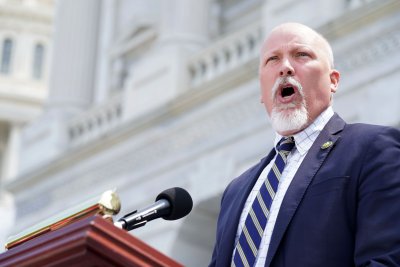House Budget Committee advances ‘Big Beautiful Bill” in late Sunday session

May 18 (UPI) — The House Budget Committee advanced President Donald Trump‘s “One Big Beautiful Bill Act” in a rare Sunday night vote.
They met at 10 p.m. to consider the bill that extends Trump’s tax cuts, increases border funding priorities and requires Medicaid recipients to work.
The measure passed 17-16 along party lines, with four Republicans who rejected the bill the first time on Friday voting present Sunday: Ralph Norman of Oklagoa, Chip Roy of Texas, Andrew Clyde of Georgia and Josh Brecheen of Oklahoma. They voted against the bill Friday, preventing it from advancing then.
Roy said he voted present “out of respect for the Republican Conference and the president,” but doesn’t support the bill as it stands.
He posted on X: “The bill does not yet meet the moment — leaving almost half of the green new scam subsidies continuing. More, it fails to end the Medicaid money laundering scam and perverse funding structure that provides seven times more federal dollars for each dollar of state spending for the able-bodied relative to the vulnerable. This all ultimately increases the likelihood of continuing deficits and non-Obamacare-expansion states like Texas expanding in the future. We can and must do better before we pass the final product.”
He is looking forward to getting the bill way he wants it. “It gives us the opportunity to work together this week to get the job done in light of the fact our bond rating was dropped yet again due to historic fiscal mismanagement by both parties,” he wrote. “This bill is a strong step forward.”
Speaker Mike Johnson, R-Ky., said he was pleased the bill advances.
“There’s a lot more work to do, we’ve always acknowledged that towards the end there will be more details to iron out, we have several more to take care of,” Johnson said. “But I’m looking forward to very thoughtful discussions, very productive discussions over the next few days, and I am absolutely convinced we’re going to get this in final form and pass it in accordance with our original deadline, and that was to do it before Memorial Day.
“So this will be a victory out of committee tonight, everybody will make a vote that allows us to proceed and that was my big request tonight.”
The bill for fiscal year 2026, which begins Oct. 1, is 1,116 pages and is worth roughly $7 trillion. The last time Congress passed all 12 regular appropriations bills on time, before the start of a new fiscal year, was in 1996. Since then, Congress has relied heavily on continuing resolutions and omnibus appropriations bills to fund the government.
In fiscal year 2024, the federal government spent $6.8 trillion.
Before the meeting, Johnson said on Fox News Sunday he was optimistic the bill will past the House by the end of this week. Some Republican hardliners and moderates have opposed the bill along with all Democrats.
“We’re on track, working around the clock to deliver this nation-shaping legislation for the American people as soon as possible,” Johnson said. “All 11 of our committees have wrapped up their work, and they spent less and saved more than even we’ve projected initially. This really is a once-in-a-generation opportunity that we have here.”
The bill next gets put before the Rules Committee with a 9-4 Republican majority including Norman and Roy. In the full House, Republicans have just a 220-213 advantage with two vacancies after two Democrats died.
“It’s very important for people to understand why we’re being so aggressive on the timetable and why this really is so important,” Johnson said earlier Sunday. “This is the vehicle through which we will deliver on the mandate the American people gave us during the last election. You’re going to have historic savings for the American people, historic tax relief for American workers, historic investments in border security.
“At the same time, we’re restoring American energy dominance, and we’re rebuilding the defense industrial base, and we’re ensuring that programs like Medicaid and SNAP are strengthened for U.S. citizens who need and deserve them and not being squandered away by illegal aliens and persons who are ineligible to receive them and are cheating the system.”
On Friday, Budget Committee hard-liners blocked the package from moving forward — mainly over when Medicaid work requirements will commence. Under the current legislation, Medicaid requirements will kick in during 2029. Some conservatives want it to start as soon as 2027.
Norman, who voted against advancing the bill, earlier told CNN on Saturday that the earlier date was necessary for his vote.
The Center on Budget and Policies Priorities estimates 36 million Medicaid enrollees could be at risk of losing coverage because of potential work requirements and other factors.
In December, there were 78,532,341 on Medicaid and the Children’s Health Insurance Program, or CHIP, according to the agency. That includes 71,275,237 enrolled in Medicaid and 7,257,104 in CHIPS.
“Some of the states have — it takes them some time,” Johnson said. “We’ve learned in this process to change their systems and to make sure that these stringent requirements that we will put on that to eliminate fraud, waste and abuse, can actually be implemented. So, we’re working with them [hardliners] to make sure what the earliest possible date is to put into law something that will actually be useful. I think we’ve got to compromise on that. I think we’ll work it out,” Johnson claimed.”
If the House passes a bill, it goes to the Senate. Johnson said he hopes the Senate won’t alter the bill, which means it goes back to the House.
“The package that we send over there will be one that was very carefully negotiated and delicately balanced, and we hope that they [Senate] don’t make many modifications to it, because that will ensure its passage quickly,” he said.
Holdouts also want to accelerate the phasing out of tax credits for green energy projects under the Inflation Reduction Act.
The bill also includes a big increase for the Defense Department and to national security. There are cuts to federal health and nutrition programs and energy programs.
It’s a balancing act for Johnson because some changes may anger House moderates. They are phasing out the tax credits and cuts to Medicaid benefits. Trump has vowed not to cut Medicaid.
Some swing-district House Republicans want to raise the tax rate on top earners to offset the cost of lifting the cap on how much their constituents can deduct in their state and local taxes, known as SALT.
“Allowing the top tax rate to expire and returning from 37% to 39.6% for individuals earning $609,350 or more and married couples earning $731,200 or more breathes $300 billion of new life into the One Big, Beautiful Bill,” Rep. Nick LaLota of New York told CNN on Saturday.








































